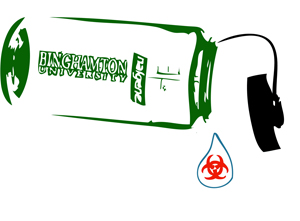
Part of the appeal of a Nalgene water bottle is their economical and environmental benefits ‘ but recent studies have shown that Nalgenes, like the ones carried in the Binghamton University Bookstore, may be hazardous to a person’s health.
Bottles made of polycarbonate plastics ‘ such as Nalgenes, toys, pacifiers, bottles and other No. 7 plastics (identified by the number ‘7’ on the bottom) ‘ all contain Bisphenol A, a chemical that can leak out of plastic lining and into water, and has been linked to endocrine disorders, certain cancers, impaired immune function, diabetes and fertility problems.
Bisphenol A is a plasticizer that’s added to brittle plastics to make them more practically useful, according to Eugene Stevens, a chemistry professor at BU. It’s been a controversial topic for a number of years.
‘There’s no question of whether it’s harmful or not,’ Stevens said. ‘The question is whether enough gets out of the plastic and over what period of time.’
Studies with rats have shown that Bisphenol A can bind to estrogen receptors and lead to skewed hormone levels that affect the functioning of the brain. It can also damage neural connections involved in memory.
Bisphenol A is especially harmful in children and pregnant women, as it can accumulate in large concentrations in the amniotic fluid surrounding a baby.
Plastic manufacturers maintain that the chemical is harmless and that the amount of Bisphenol A that leaks into food is completely within safety levels set by the Environmental Protection Agency. They say that in order for Bisphenol A to be harmful to a human, 1,300 pounds of canned food would have to be consumed daily.
Due to a lack of knowledge about Bisphenol A ‘ and the fact that humans metabolize it at a much higher rate than rats ‘ there is no consensus about the chemical’s possible effect on humans.
Some scientists say that polycarbonate plastic bottles only become unsafe when they are so old that the writing has worn off, or when they have been exposed to extreme hot or cold temperatures. Others agree with plastics manufacturers and maintain that they’re safe for use because the levels of the chemical are incredibly low, while still others warn against using the bottles at all.
As a result of this confusion, Andrew Leavey, a freshman who recently learned of the chemical, would like to see the bookstore issue a recall and stop selling the No. 7 bottles. He says there are alternatives, including purchasing different bottles from the same company that are made of No. 2 or No. 4 plastics.
‘We’re teenagers, we’re still growing and changing,’ Leavey said. ‘For the Bookstore to sell bottles with decomposing chemicals is a danger and a health hazard.’
Heather Prescott, manager of the bookstore, says that there is no recall planned as of yet.
‘We haven’t had anything come through from the company that manufactures them about a possible recall, so we’re waiting,’ she said. ‘If testing shows that there’s hazardous chemicals [in Nalgenes], then we will do a recall.’
Concerned students can take certain steps to limit the amount of Bisphenol A entering their water. According to an article on thegreenguide.com, a Web site owned by the National Geographic company, No. 7 bottle users should avoid putting the containers in dishwashers ‘ where they’re exposed to high heat ‘ and instead hand wash them in warm soapy water, which protects the bottles from wear.
Replacing them every year or so can also help, as newer bottles tend to have fewer abrasions in the plastic. Users should also avoid drinking water that’s been inside a Nalgene for 24 hours or more, as this can lead to ingestion of slightly higher levels of the chemical.


